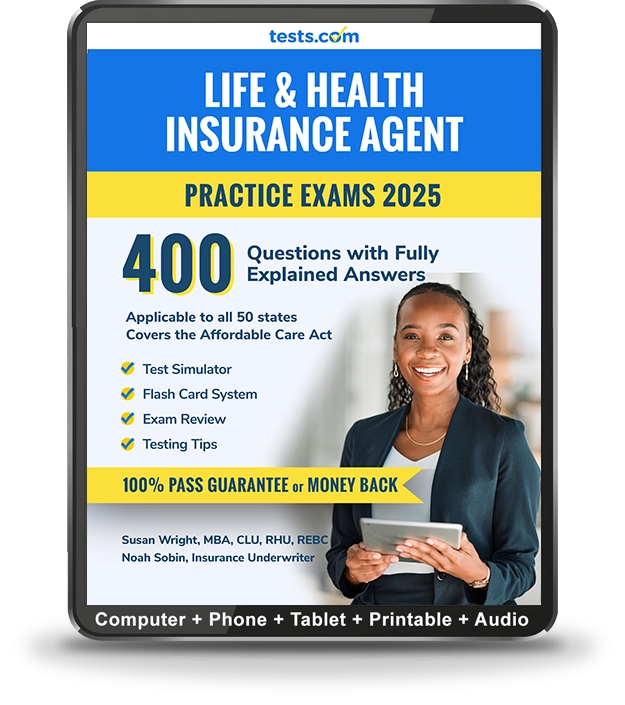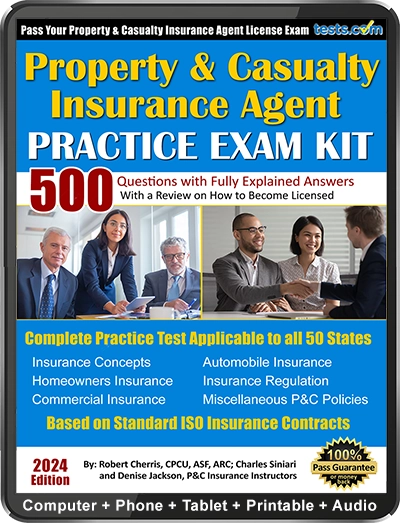Life and Health Insurance SalesTest Guide
Life and Health Insurance Sales Test Summary |
|
|---|---|
| What: This exam grants certification to become a life and health insurance agent. | |
| Who: Anyone wishing to become certified as a life and health insurance agent. | |
| Where: The exam is administered at various testing locations. | |
| When: The test is administered year round. | |
| How: The exam is multiple choice. | |
| Type: The exam is computer-based. | |
| Why: The exam is required to become certified as a life and health insurance agent. | |
| Time: Varies | |
| Language: English | |
| Preparation: Many test guides and preparation materials are available for purchase. | |
| Cost: There may be test registration fees. | |
All of the fifty states require anyone who wants to sell life and health insurance to first take an exam to obtain an insurance sales license. The exam is offered by the state licensing boards. Candidates are not typically required to take a course to prepare for the exam; however each state offers many different courses both online, in the classroom or by book. Once licensed, there are professional organizations that offer certification programs to obtain advanced designations and training in specialty areas that also may require exams.
Licensure. State law and regulations require that insurance sales agents selling life and health insurance obtain a license before working within the state. Different licenses are needed for property and casualty insurance sales and life and health insurance sales.
A life and health Insurance examination will typically cover the following subjects:
- Insurance regulation
- General insurance
- Life insurance basics
- Life insurance policies
- Life insurance policy provisions, options, and riders
- Annuities
- Federal tax considerations for life insurance and annuities
- Qualified health plans
- Individual health insurance policy general provisions
- Disability income and related insurance
- Medical plans
- Health maintenance organizations
- Group health insurance
- Dental insurance
- Insurance for special needs individuals and senior citizens
- Federal tax considerations for health insurance
- Additional considerations for life and health insurance counselors
The average exam has about 150 questions and is taken on a personal computer at an examination testing center. All of the questions are multiple choice and the questions will either be direct questions, incomplete sentence, or “all of the following except.”
Scores will usually be given to candidates immediately after completion of the exam. To pass, candidates will have to answer at least 70 percent of the questions correctly. The score card will comprise of the overall score, how many questions were answered correctly, and a declaration of if you have passed or failed. A summary of the performance in each section will also be provided.
There are many different resources available for preparing for the Life and Health insurance examination. A multitude of classes, flashcards, study guides and practice exams are available online and in book stores.
After getting the proper securities license, insurance agents may also sell securities and other financial products. To get licensed to sell such products requires the passing of additional exams, the Series 6 or Series 7 licensing exam, both of which are administered by the National Association of Securities Dealers (NASD). The Series 6 exam deals with the sale of mutual funds and variable annuities. The Series 7 exam qualifies agents as general securities sales representatives. To get more information about the Series 7 exam, see The Securities Test Guide.
Certification. There are professional organizations in insurance sales that offer agent certification and designation in specialized areas of insurance and financial consulting. To become certified and obtain the designation, and to retain it, agents may be required to pass exams.
For instance, The National Alliance for Insurance Education and Research offers many different courses in health, life and property and casualty insurance for insurance agents. The programs are voluntary and offer an agent a designation to assure clients and employers that an agent has a thorough understanding of the relevant specialty.
Beyond insurance, in the field of financial planning, an agent may earn a certified financial planner designation to demonstrate competency as a financial planner. The Certified Financial Planner Board of Standards offers the Certified Financial Planner credential. To get certified, a candidate must have relevant experience, complete education requirements, pass a comprehensive examination and adhere to a code of ethics. The CFP exam evaluates a candidate's knowledge of the financial planning process, insurance and risk management, employee benefits planning, taxes and retirement planning and investment and estate planning. To learn more about the CFP exam, see the CFP Exam Guide.




